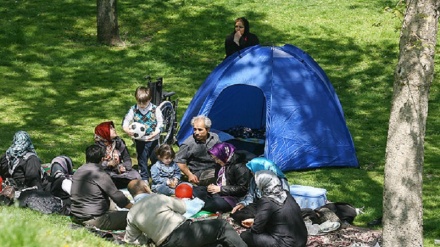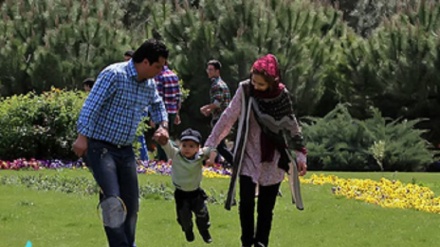Iranian Family (44)
Welcome to this week's episode of the series "Iranian Family". Not all families provide peace of mind for the family members, given that at times for a number of reasons, the existing familial circumstances deny family members a peaceful atmosphere.
The root cause of such issues of concern should be sought in the terms of relations among spouses; given that within some families, all spouses think about is to materialize their rights, while forgetting the core principle of married life which is expression of amity, kindness and understanding to one's spouse.
Such families are shaken and fragile; given that their sole backbone is founded on rigid rules and regulations, which in the absence of emotional bonds among married couples, are insufficient for the maintenance and survival of the related families.
In the view of sacred religion of Islam; a sustainable, stable, and healthy family is one whose main goal is to maintain and cement the relationship of the married couple through the reinforcement of emotional bond between them and fulfillment of religious beliefs. The divine prophets, and the Prophet of Islam's Infallible Household (PBUT) made utmost efforts to reinforce the foundations of family.
Maintenance of the foundations of family is mainly based on reliance on ethical values and virtues; in the absence of which formation of strong emotional bonds in the family, and appropriate upbringing of children turns into an impossible task.
In a balanced family, the family members trust each other and do not take advantage of this mutual trust. They take care of each other and attach significant importance to each other's mental and physical health. They maintain their optimism. These families put emphasis on religion, wisdom, and logic and forgive each other's mistakes and faults. More importantly, in these families, spouses are always loyal to each other, and never compare their spouse's merits and abilities with others.
In the contemporary families, which are comprised of parents and children; the presence of grandparents has partly faded away. Nonetheless, in many Asian countries, and in Iran, there are extended families, within which grandparents live alongside parents and children, under the same roof. A number of studies have pointed out that in Asian countries, including Iran, grandparents play a decisive role in children's upbringing. Grandparents' profound experiences can be crucial and vital in turning children into law-abiding and responsible citizens.
Many associations have put emphasis on the huge contribution of grandparents in children's upbringing.
In the meantime, based on a recent study which has been carried out at Glasgow University in Scotland, although grandparents mean well, sometimes their behaviors leave negative impacts on children's health. For instance, based on this study, children within the 3 to 9 years old age group, who are taken care of, by their grandparents, face weight gain more than children who are taken care of, by single parents. Nonetheless, presence of grandparents at home, is a huge blessing for children's upbringing. Children, who benefit from the presence of grandparents at home, are less vulnerable and maintain better resting patterns. In these extended families, children are less likely to feel lonely, and they enjoy relative peace of mind. Furthermore, children who are brought up in the presence of their grandparents, maintain stronger social bonds and turn into more sociable individuals.
Meanwhile, parents and grandparents should be coordinated in familial matters. Undoubtedly, the approaches of parents and grandparents aren't the same, which could lead to children's confusion. Children quickly gather information about life, especially in pre-school years. Differences of opinion among parents and grandparents could confuse children. In the meantime, children should not find out the differences of opinion among parents and grandparents. Otherwise, children could be tempted to fish from troubled waters.
MR/ME


